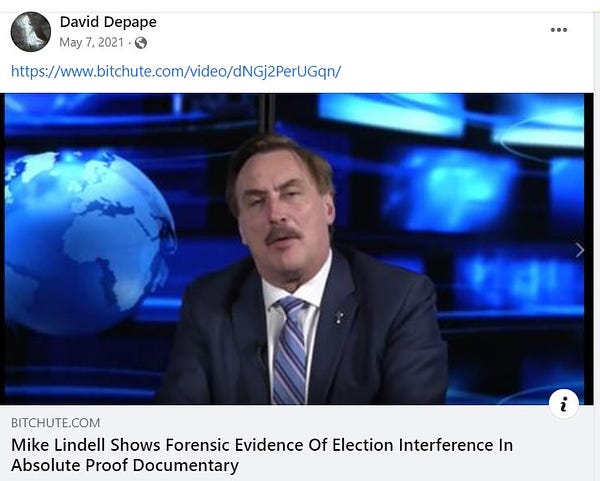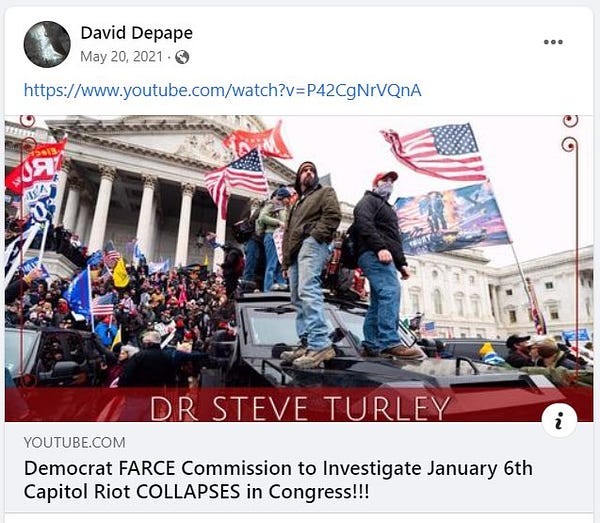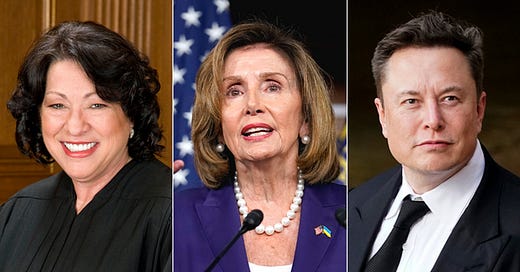
Lifting Up, Acting Out, and Just Not Caring
Sotomayor's praise of Thomas, the brutal attack on Paul Pelosi, and Elon Musk's Twitter purchase.
The Lift-Up
It didn’t receive a whole lot of attention at the time, but earlier this month, at Roosevelt University in Chicago, liberal Supreme Court Justice Sonia Sotomayor was asked about her relationship with conservative Justice Clarence Thomas, and her answer probably surprised some people:
“I have disagreed more with him than with any other justice, which means we don’t come together on many cases. And yet I can tell you that I spend time with him, understanding that he is one of the few justices who knows practically everybody in our building. He knows their name, he knows the things about their life, what their family is suffering. He’ll tell me, ‘You know that that person’s wife is sick right now, or that person’s child is having difficulty.’”
“There’s no other justice who does that. I try, but he does it better. He cares about people.”
Regardless of how one feels about Sotomayor, Thomas, or their respective views and decisions on the Supreme Court, I thought this testimonial spoke very highly of both of them.
For one, it illustrated the power and character of lifting up others. Thomas does it by taking a genuine interest in his co-workers’ lives. Sotomayor did it, in this case, by sharing with others a side of Thomas that many of her admirers and ideological allies probably didn’t want to hear.
It also served as a simple reminder that not everything in today’s politics has to amount to anger, conflict, and division (regardless of what cable-news and internet pundits insist). Opponents don’t have to be enemies. Heck, they don’t even have to be thought of as opponents in many cases.
If only more people adopted such a mindset…
The Uptick in Political Violence
“As we wait to hear more, every single American needs to be lowering the temperature. This is increasingly obvious: Disturbed individuals easily succumb to conspiracy theories and rage — the consequences are bloody and un-American."
Those were the words of Sen. Ben Sasse (R-Neb.) last Friday, in response to the violent assault on Paul Pelosi, husband of Speaker of the House, Nancy Pelosi.
The attacker broke into the Pelosis’ San Francisco home, armed with a hammer, zip-ties, and duct tape, and reportedly shouting, “Where is Nancy?” The Speaker was safe in Washington, but her husband suffered a skull fracture and others serious injuries before arriving police officers pulled the assailant off him, and rushed the 82 year-old to the hospital for emergency surgery.
Thankfully, Paul is expected to make a full recovery. But as Tim Alberta of The Atlantic pointed out, such fortune is bound to run out:

I’d add the attempted murder of Justice Kavanaugh to that list as well. If not for a last-minute change of heart aided by texts from the would-be assailant’s sister, who knows what would have happened, including to other members of Kavanaugh’s family and possibly even the other justices on the man’s list. (Incidentally, it’s hard to believe that was less than five months ago.)
Whenever an act of political violence occurs in this country, the tribe whose member or members were targeted are quick to draw a direct link between what happened and reckless rhetoric from the other side. Sometimes that link is real and quite obvious. Other times, it isn’t nearly as clear.
Nonetheless, I think economist Patrick Chovanec is onto something here:

Of course, that “someone” may not actually be on “your side.” The deranged individual who attacked Paul Pelosi was originally thought to be a committed MAGA right-winger… I think for some fair enough reasons:



But other information has since come out suggesting that his politics (among other social views) are more eclectic:


Tribal commitments aside, Sasse’s point holds: “disturbed individuals easily succumb to conspiracy theories and rage.” And with both being mainstreamed in today’s politics, to a degree that I haven’t seen in my lifetime, it’s no wonder the same has been true of political violence.
As Chovanec suggests, we minimize such incidents at our own peril. We’ll never be able to stop every mentally troubled person from doing disastrous things, but we can certainly lower the volume on mass-delusion and hatred, and unite to take to task those with influence who refuse to (even in the direct aftermath of political violence):
The Chief Twit
I’ve had pretty much the same take on Elon Musk and Twitter since the moment the billionaire tycoon first expressed interest in owning the social media company: total indifference.
I’m serious. Despite spending a fair amount of time on Twitter (which still serves as a good news and commentary aggregator, if you use it right), I couldn’t care less who owns it or what happens to it. And frankly, it’s weird to me that so many people do.
In fact, I’ve been having a hard time deciding what’s more ridiculous: watching people on the left treat Musk’s acquisition as an act of tyranny, or watching people on the right rejoice over “free speech” being restored to the universe.
Folks, it’s neither. It’s just a website. Despite the hysterics, the stakes of the Musk purchase are virtually meaningless.
For those of you worried about whatever offensive content you now might be exposed to, rest assured that you’ll have the same recourse you’ve always had: mute, block, and filter options, and of course the broader (and perhaps smartest) alternative of them all: simply not logging in (it’s not like anyone’s forcing you to).
For those of you celebrating that you’re no longer being silenced, consider that Twitter was never “silencing” you in the first place. No one has an inherit right to express themselves however they see fit on someone else’s privately owned platform, and even if you were one of the relatively few whose past Twitter treatment was inconsistent with other users due to some political or ideological bias, the fact remains that we’re still just talking about a website… and a second-tier one at that.
As stated in a recent Wall Street Journal piece, “Twitter these days is one of the most talked about major social-media platforms and simultaneously one of the least-used.” Sure enough, as far as social-media popularity goes, it barely ranks in the top 15… placing well below Facebook, YouTube, Instagram, TikTok, Snapchat, and a bunch of platforms I’ve never even heard of. Yet, a lot of people on both sides of the political divide view Twitter as a pivotal battlefield in the culture war.
Sorry, but I don’t. Previous owners could do with it whatever they wanted, and now Elon Musk can do with it whatever he wants… including pulling a Snake Plissken, and just shutting the whole thing down.
Only, unlike in the highly disappointing Escape from New York sequel, and despite a lot of people who would assuredly act otherwise, it wouldn’t mark the end of “everything we’ve accomplished for the past 500 years… our technology, our way of life, our entire history.”
Why not? Again, because it’s just a freakin’ website. It doesn’t really matter.














"Regardless of how one feels about Sotomayor, Thomas, or their respective views and decisions on the Supreme Court, I thought this testimonial spoke very highly of both of them.
"For one, it illustrated the power and character of lifting up others. Thomas does it by taking a genuine interest in his co-workers’ lives. Sotomayor did it, in this case, by sharing with others a side of Thomas...."
That any of this would be a subject of such a commentary shows that we're defining malignant ignorance downward - to paraphrase the late Sen. Pat Moynihan - and strength of character upward . The response to all that verbiage should be, wait for it, "SO?" - to paraphrase that ever voluble former VP Dick Cheney.